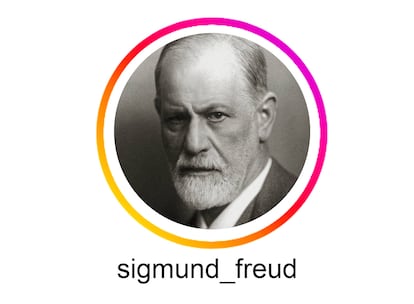‘If he doesn’t go to therapy, don’t sleep with him’: The dangers of trivializing mental health
Medical terminology is being used more and more lightly: Tinder users even boast about going to therapy to appear more attractive. This is making it more difficult to determine if we are receiving proper treatment or just self help

John Waters said: “If you go home with somebody, and they don’t have books, don’t fuck them!” Today there is a new, more demanding version of this advice: “If he doesn’t go to therapy, don’t go to sleep with him.” It’s not just a joke. Now that therapy has seeped into all aspects of life, it’s even used in Tinder profiles as a way of showing you are emotionally responsible, as reported by U.S. media outlets such as The New York Times.
Today, psychological terms are commonly tossed about in everyday conversation — expressions such as “red flag,” “gaslight” and “trauma.” Even rappers have embraced this world in their music. Jay-Z mentions his therapist in songs like 4:44, while Kendrick Lamar went a step further by structuring his album Mr. Morale (2022) as a series of therapy sessions. Drake also alludes to his abandonment issues in Churchill Downs, a collaboration with Jack Harlow.
It would be easy to relate this trend to the rise of self-absorption. The success of selfies in contemporary art, of autofiction in literature and the autobiographical in music (did someone say Taylor Swift?) would reinforce the thesis that we love to talk about ourselves. But therapy goes one step further, because it addresses real suffering and symptoms that often constitute mental illnesses.
Victims or mentally ill?
The appearance of these symptoms in millions of young people, almost simultaneously and during an economic cycle marked by pessimism and precariousness (the so-called “mental health epidemic”), leads many experts to believe that we are facing a collective and generalized malaise which, in the words of the philosopher Amador Fernández-Savater, is an “overflow malaise caused by a triple collapse: psychic, social and ecological.” Amid this crisis, the question is whether people are seeking help from therapists, and if therapy is of any help to them. The situation in the United States is not encouraging: studies warn that the rise in mental health treatment has not led to an increase in the psychological well-being of citizens. Quite the contrary
Psychiatry is the most controversial discipline within medicine. Historically it has been seen as a double-edged sword because in certain contexts (especially political) it has functioned as a device to control patients instead of relieving their pain, and its foundations are still debated. Recently, Dutch psychiatrist and scientist Jim Van Os explained to EL PAÍS: “There is too much heterogeneity and variation for people to fit into a diagnosis.”

Specialists have been searching for neurobiological markers for mental illness for decades; markers that would allow mental illness to be assimilated to other diseases and would confirm the suitability of standardized pharmacological treatments. However, so far this evidence has not been forthcoming and the behavior of patients continues to be the most important factor when making a diagnosis. “For the vast majority of mental health conditions, no biological markers have been found, so we do not have any biological test to verify any type of psychiatric diagnosis,” explained British psychologist James Davies to EL PAÍS in 2022.
This brings us to another great contemporary paradox about therapy: when it becomes more visible in our lives and terms such as “anxiety,” “trauma” and “red flags” become more popular, that’s just when there was a shift against psychoanalysis, which was developed by Sigmund Freud and later developed by Jacques Lacan. At least, this is what has happened in certain areas such as hospitals and university departments, which have been relying on cognitive-behavioral therapy and drugs for years. In a column published in EL PAÍS in 2023, psychiatrist and biologist Cristian Llach asked himself: “Will the day come when psychiatrists will stop interpreting subjectively, improvising and functioning through trial and error? These are questions that are managing to leave their traditional ivory towers: laboratories, universities and research circles. But will they ever be able to reach mental health clinics?”
Sigmund, analyze this
Psychoanalysis influenced the culture of the last century like nearly no other current of thought. Its legacy extends from the works of Proust to today’s culture news headlines, where television critics exclaim “Freud was right!” if it’s revealed that one of the characters was driven by sex. However, it is discredited in many sectors.
“The discrediting of psychoanalysis and the place that wants to consider it a pseudoscience is above all academic,” explains Manuel Gonzalez Molinier, a psychiatrist. “The reason is obvious: both the cognitive-behavioral method and the neurobiological explanations of mental illness are experiencing a moment of certain failure, meaning they believe their spheres of power are under threat and attack with more violence the only discipline that is based on working with the singular factors of each case. Psychoanalysis has never lent itself to the kind of manualization that is easily sold by American insurance companies, that ‘you apply 20 sessions, talk about these things and you will cure the patient in those 20 sessions.’ It is not a drug.”
Indeed, the defenders of psychoanalysis are the most critical of the trivialization of therapy and argue that, as it has been practiced in recent years, it often becomes self-help. “We are moving towards a hyperpsychologized society, but psychoanalysts think that the fundamental issues are not being addressed,” says González. He also recognizes that “what Freud proposes is still controversial or unpopular because it appeals to childhood traumas and argues that there are a lot of unconscious factors that we do not control. But the truth is that in consultation we continue to take into account the existence of unconscious processes, and working with words continues to be essential. You have to make an individual suit with the biographical factors of each patient, paying close attention to childhood.”
Jara Pérez, psychologist, also practices psychoanalysis and believes that this is one of the few forms of therapy that makes the patient take responsibility for the process. She does not believe that the culture of therapy is giving rise to egocentric or selfish individuals, as the cliché suggests, but, rather, to lazy people in search of quick solutions: “I find it very problematic that we are constantly looking for people to help us. I solve the problem: I go to a psychologist to receive advice, I go to a nutritionist to teach me how to eat, I go to a personal trainer to teach me how to exercise... in this way, a large part of our autonomy is lost. And what psychoanalysis does is put that autonomy on the table.”
Therapy or union action
“What today is labeled as depression, is rather a generalized desertion,” says Fernández-Savater. “Thousands of people ask for work leave for depression and, in reality, their low mood has to do with bad working conditions, a meaningless job, a shitty job as David Graeber says.”
It is common to read in X that therapy is useless against these issues, and that “a worker does not need therapy, but to join a union,” says Fernández-Savater. “What that alternative means is that the evils are objective-structural. I believe that the situation is more complex: the malaise not only has objective causes, but comes from a relationship with the world, with the internalization of the logics of performance and competitiveness.”
Gonzalez gives a concrete example: “Sometimes the patient needs both because the reason why they arise from their helplessness has unconscious elements. For example, in the case of [Spanish economist] Nevenka Fernandez, it took a psychoanalyst for her to see what was obvious to others: that she was a victim of sexually harassment. In the end, a psychiatrist referred her to a psychoanalyst and the psychoanalyst worked with her until she could take charge of her own body, come out of her depression and, when that awakening occurred, report [her abuser].”
For Pérez, there is no reason why political activism and therapy can’t be compatible, quite the opposite: “Everything is done in a place: what I work on in therapy has to do with how the structure has developed my subjectivity, but in the union I do something else, the social struggle is something very different. Another question is whether the therapeutic culture has become a control device, with that I totally agree, because mainstream therapy, cognitive-behavioral therapy has a lot of ‘it is not what happens, but how you see it,’ since it works with thoughts and behaviors. There’s a lot of blaming going on there.”
So, is the therapy of today precisely what is most harmless to the system and least useful to solving patients’ problems? “Effectively,” the psychologist answers. “In the end, what mainstream therapy does is adjust you so that you keep producing, and it is completely benign to the system, because it does not help you analyze reality.”
Amid this context, Fernandez-Savater proposes to bringing back the Freudian concept of “sublimation” and collectivizing it. The philosopher concludes: ““Freud called sublimation to know what to do with discomforts, to convert what harms us into transformation energy. He reserved it for artists and geniuses, and that seems to me to be a mistake. Collective action is not only transformative, it is also possible for everyone and, in this sense, therapeutic.” Maybe that could also be put on Tinder.
Sign up for our weekly newsletter to get more English-language news coverage from EL PAÍS USA Edition
Tu suscripción se está usando en otro dispositivo
¿Quieres añadir otro usuario a tu suscripción?
Si continúas leyendo en este dispositivo, no se podrá leer en el otro.
FlechaTu suscripción se está usando en otro dispositivo y solo puedes acceder a EL PAÍS desde un dispositivo a la vez.
Si quieres compartir tu cuenta, cambia tu suscripción a la modalidad Premium, así podrás añadir otro usuario. Cada uno accederá con su propia cuenta de email, lo que os permitirá personalizar vuestra experiencia en EL PAÍS.
¿Tienes una suscripción de empresa? Accede aquí para contratar más cuentas.
En el caso de no saber quién está usando tu cuenta, te recomendamos cambiar tu contraseña aquí.
Si decides continuar compartiendo tu cuenta, este mensaje se mostrará en tu dispositivo y en el de la otra persona que está usando tu cuenta de forma indefinida, afectando a tu experiencia de lectura. Puedes consultar aquí los términos y condiciones de la suscripción digital.









































